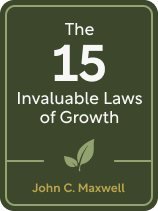

This article is an excerpt from the Shortform book guide to "The 15 Invaluable Laws of Growth" by John C. Maxwell. Shortform has the world's best summaries and analyses of books you should be reading.
Like this article? Sign up for a free trial here.
What’s the Law of the Mirror? How can it help you grow as a person?
The Law of the Mirror, John Maxwell says, is that you can’t add value to yourself until you see value in yourself. In other words, self-worth can help you achieve personal growth. He provides advice on how you can learn to see value in yourself more.
Keep reading to learn about the Law of the Mirror and how it can help you grow.
The Law of the Mirror
What’s the Law of the Mirror? John Maxwell contends that you must see value in yourself before you can add to that value. Self-worth is the belief that you’re both worthy and capable of reaching your potential. If you don’t believe that you can grow or that you’re worthy of growth, you’re unlikely to grow. It’s as simple as that.
(Shortform note: Maxwell says that you need self-worth before growth. But, for most people, self-worth is a lifelong project. You’ll always be discovering new things about yourself—which is why it’s not uncommon to shift to a new career when your values change. And, for some people, self-worth can be a long journey: Research suggests that self-esteem, which is one component of self-worth, waxes and wanes over the course of a lifetime. Since self-worth fluctuates so much, there’s no “right amount” to have before beginning your growth journey—you need only to see value in yourself well enough to get started.)
Why Self-Worth Helps You Grow
According to Maxwell, self-worth empowers you to achieve your goals—it helps you know your worth, motivating you to invest in yourself. You’ll see the value in opportunities to better yourself, and you’ll be more inclined to go after them. Self-worth also naturally translates into self-confidence, which helps you overcome self-doubt and see your opportunities through.
(Shortform note: Maxwell’s suggestion—to work from a place of self-worth—runs contrary to what many people do—use their self-loathing as motivation to change what they don’t like about themselves. Research suggests that Maxwell’s method is more effective: Self-criticism can hold you back from making progress toward your goals. Psychologists also say that self-bullying has a negative impact on your mental health, so it’s more effective to be kind to yourself when trying to achieve goals.)
How to Cultivate Self-Worth
We’ve covered why self-worth is essential to personal growth, as it’s responsible for your ability to create and pursue achievable goals. Now, let’s explore how you can cultivate this skill.
If you struggle to know your worth or to feel confident in yourself, Maxwell recommends the following practices for bolstering self-worth:
1) Take pride in your character and previous achievements. If you’ve made any good choices or a positive impact in someone else’s life, even in small ways, congratulate yourself.
(Shortform note: One way to celebrate your character and achievements is to reward yourself with something you enjoy, like an at-home spa day or a delicious treat. According to psychologists, rewarding yourself links desired behaviors with an increase in dopamine—a “feel-good” neurotransmitter that your brain releases when you do something pleasurable. Over time, you’ll associate desired behaviors with dopamine release, which encourages you to continue these behaviors in the future.)
2) Practice positive self-talk. Let go of limiting beliefs, such as the belief that you’re not smart enough to achieve your dreams, and tell yourself that you can do what you set your mind to.
(Shortform note: Limiting beliefs are those that tell you that you can’t do something you want or need to do because you’re not good enough, smart enough, lovable enough, and so on. One way to dispel limiting beliefs is to challenge them—that is, reason out why these beliefs are probably untrue. For example, if you formed the limiting belief that you don’t deserve romantic love, you might explore reasons that you are deserving of love, starting with a list of things that are lovable about you. Once you work through and reject these limiting beliefs, it’s easier to say—and believe—positive things about yourself.)

———End of Preview———
Like what you just read? Read the rest of the world's best book summary and analysis of John C. Maxwell's "The 15 Invaluable Laws of Growth" at Shortform.
Here's what you'll find in our full The 15 Invaluable Laws of Growth summary:
- Why personal growth is essential to living a meaningful life
- How to build strong character and live with integrity
- How to envision, commit to, and pursue meaningful goals






